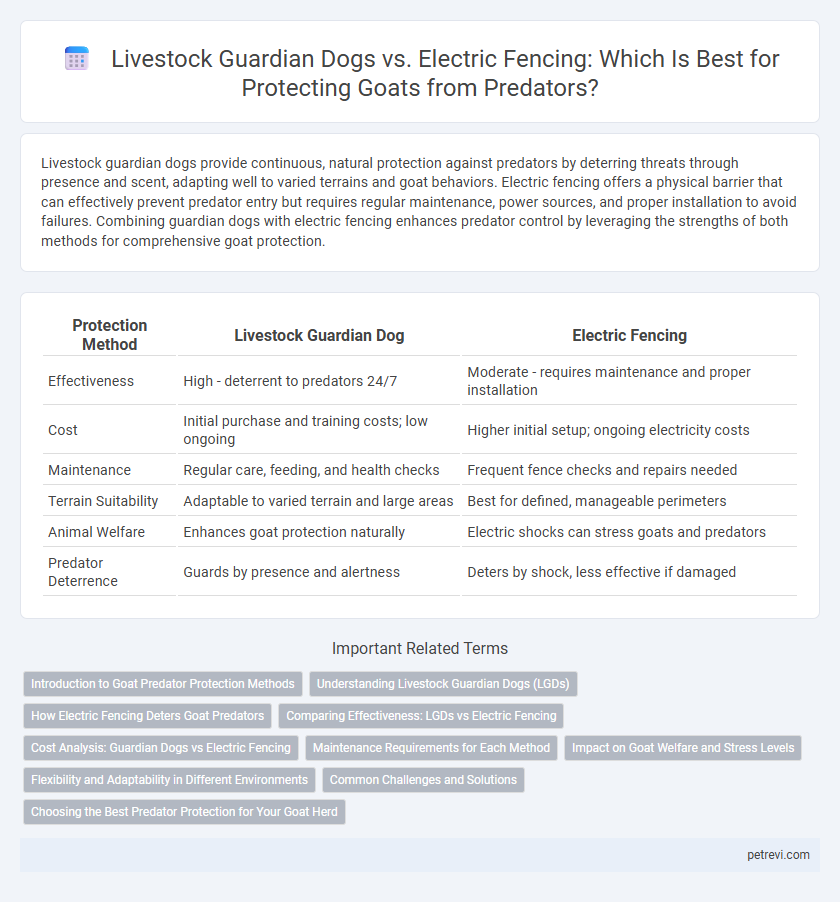Livestock guardian dogs provide continuous, natural protection against predators by deterring threats through presence and scent, adapting well to varied terrains and goat behaviors. Electric fencing offers a physical barrier that can effectively prevent predator entry but requires regular maintenance, power sources, and proper installation to avoid failures. Combining guardian dogs with electric fencing enhances predator control by leveraging the strengths of both methods for comprehensive goat protection.
Table of Comparison
| Protection Method | Livestock Guardian Dog | Electric Fencing |
|---|---|---|
| Effectiveness | High - deterrent to predators 24/7 | Moderate - requires maintenance and proper installation |
| Cost | Initial purchase and training costs; low ongoing | Higher initial setup; ongoing electricity costs |
| Maintenance | Regular care, feeding, and health checks | Frequent fence checks and repairs needed |
| Terrain Suitability | Adaptable to varied terrain and large areas | Best for defined, manageable perimeters |
| Animal Welfare | Enhances goat protection naturally | Electric shocks can stress goats and predators |
| Predator Deterrence | Guards by presence and alertness | Deters by shock, less effective if damaged |
Introduction to Goat Predator Protection Methods
Livestock guardian dogs provide an active defense against predators by using their natural instincts to patrol and protect goat herds, reducing predator attacks through presence and deterrence. Electric fencing offers a physical barrier that deters predators by delivering a mild shock upon contact, creating a controlled perimeter around goat pastures. Both methods aim to enhance goat safety by addressing predator threats through either behavioral disruption or physical exclusion.
Understanding Livestock Guardian Dogs (LGDs)
Livestock Guardian Dogs (LGDs) are specially bred and trained to protect goats by deterring predators through their presence, scent, and territorial behavior, reducing the need for physical barriers. These dogs form close bonds with goat herds, enhancing their effectiveness in minimizing threats from coyotes, wolves, and other predators in various grazing environments. Their natural guarding instincts and ability to cover large areas make LGDs a sustainable and adaptable solution for goat predator protection compared to electric fencing.
How Electric Fencing Deters Goat Predators
Electric fencing creates a physical and psychological barrier that effectively deters common goat predators such as coyotes, wolves, and foxes by delivering a mild shock upon contact. The consistent presence of an electric fence conditions predators to avoid the enclosure, reducing the chances of goat attacks. Proper installation with multiple strands and adequate voltage ensures optimal protection against nocturnal and persistent predators.
Comparing Effectiveness: LGDs vs Electric Fencing
Livestock Guardian Dogs (LGDs) provide active, adaptive protection by deterring predators through presence, scent, and behavior, making them highly effective in dynamic environments with varying predator threats. Electric fencing offers a passive barrier that relies on maintenance and livestock training, effectively deterring many predators but sometimes failing against persistent or highly motivated animals. Combining LGDs with electric fencing often results in superior predator protection by leveraging the strengths of both biological and physical deterrents for goat herds.
Cost Analysis: Guardian Dogs vs Electric Fencing
Livestock guardian dogs require an initial investment between $500 to $1,500 per dog, with ongoing costs such as food, veterinary care, and training averaging $300 to $600 annually. Electric fencing systems involve upfront expenses typically ranging from $1,000 to $3,000 depending on acreage, plus maintenance and electricity costs averaging $100 to $200 per year. While guardian dogs offer adaptive, mobile protection, electric fencing demands significant setup and regular upkeep, impacting long-term cost-effectiveness for goat predator protection.
Maintenance Requirements for Each Method
Livestock guardian dogs require regular feeding, health check-ups, and training to maintain effective predator protection for goats. Electric fencing demands consistent inspections for damage, battery or power source maintenance, and vegetation control to prevent short circuits. Both methods involve ongoing upkeep, but guardian dogs offer organic surveillance, while electric fencing relies heavily on mechanical functionality.
Impact on Goat Welfare and Stress Levels
Livestock guardian dogs provide a natural deterrent to predators, reducing stress and promoting positive welfare in goats through their constant presence and protective behavior. Electric fencing can be effective but may cause stress or injury if goats become anxious or attempt to breach the barrier. The choice between these methods significantly affects goat well-being, with guardian dogs generally enhancing safety while minimizing negative stress responses.
Flexibility and Adaptability in Different Environments
Livestock guardian dogs provide unmatched flexibility and adaptability for goat predator protection by instinctively adjusting to various terrains and weather conditions, ensuring constant vigilance. Unlike electric fencing, which can be compromised by harsh environments or power failures, guardian dogs adapt their behavior based on predator presence and environmental changes. This dynamic protection method improves safety in diverse settings, from mountainous pastures to expansive open fields, without requiring extensive infrastructure modifications.
Common Challenges and Solutions
Livestock guardian dogs face challenges such as requiring extensive training, potential health issues, and the risk of predation if the dog is inexperienced or ineffective against large predators. Electric fencing can struggle with faults like power outages, poor maintenance, and wildlife habituation to shocks, reducing its deterrent effect. Solutions include combining guardian dogs with regularly inspected, properly grounded electric fences and using predator-specific training techniques to enhance overall protection for goat herds.
Choosing the Best Predator Protection for Your Goat Herd
Livestock guardian dogs provide continuous, proactive protection by deterring predators through presence and vocal alerts, making them highly effective for goat herds in diverse terrains. Electric fencing offers a cost-effective, barrier-based defense but requires regular maintenance and can be less reliable in extreme weather or against determined predators like wolves or coyotes. Selecting the best predator protection depends on herd size, geographic location, predator threats, and budget, with many goat farmers combining both methods for optimal security.
Livestock Guardian Dog vs Electric Fencing for Goat Predator Protection Infographic

 petrevi.com
petrevi.com